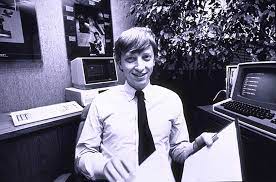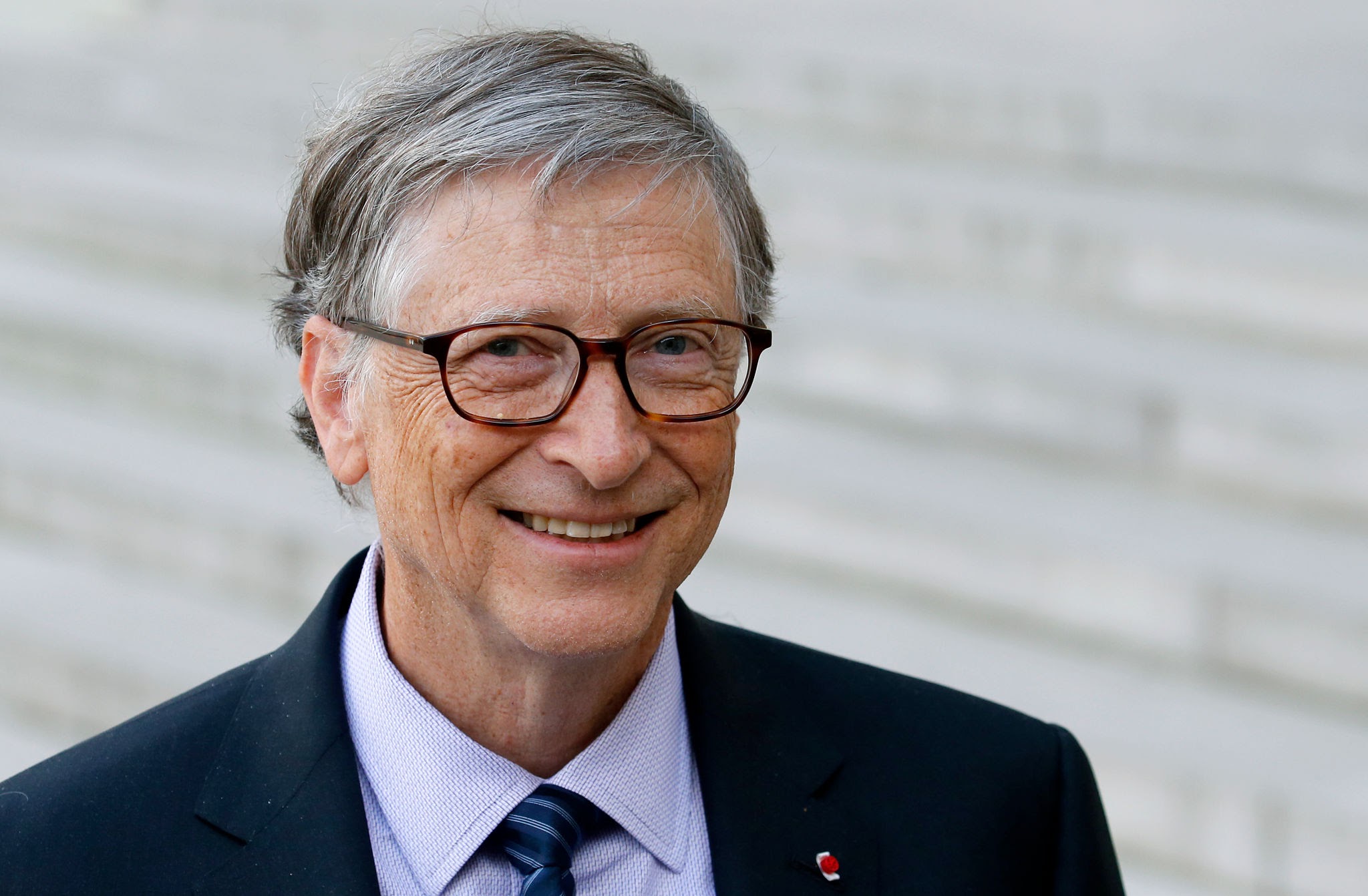Bill Gates is a renowned American business magnate, software developer, and philanthropist. He co-founded Microsoft Corporation, one of the world’s largest technology companies, and played a pivotal role in the personal computer revolution. Here’s a biography of Bill Gates:
Early Life and Education:
Bill Gates was born on October 28, 1955, in Seattle, Washington, USA. His full name is William Henry Gates III. He was born into a family of intellectuals, with his father, William H. Gates Sr., being a prominent attorney, and his mother, Mary Maxwell Gates, being a businesswoman and a board member of several organizations.
From a young age, Gates showed exceptional intellectual ability. He attended Lakeside School, a private school in Seattle, where he discovered his passion for programming. At the age of 13, he began programming in BASIC on a teletype terminal, and he later developed a tic-tac-toe game that allowed students to play against the computer.
Entrepreneurship and Microsoft:
In 1973, Gates enrolled at Harvard University, but he dropped out after two years to pursue his passion for software development. Along with his childhood friend Paul Allen, Gates started a small software company called Microsoft in 1975. They aimed to develop and sell software for the emerging personal computer market.
Microsoft gained significant success with the release of MS-DOS, an operating system for IBM-compatible computers, in the early 1980s. The breakthrough came in 1985 when Microsoft introduced Windows, a graphical operating system that revolutionized the computing industry. Under Gates’ leadership as CEO, Microsoft became the dominant player in the PC software market, with products like Microsoft Office, Internet Explorer, and Windows becoming household names.
Philanthropy and Later Career:
In 2000, Bill Gates stepped down as CEO of Microsoft and assumed the role of Chief Software Architect. He gradually shifted his focus toward philanthropic efforts through the Bill & Melinda Gates Foundation, which he co-founded with his then-wife Melinda French Gates in 2000. The foundation aims to improve healthcare, reduce poverty, and enhance education worldwide.
As a philanthropist, Gates has been actively involved in addressing global issues such as infectious diseases, improving agriculture, and advocating for clean energy. He has donated billions of dollars to various causes and initiatives through his foundation.
In 2021, Bill and Melinda Gates announced their decision to end their marriage after 27 years. However, they confirmed their continued collaboration on the philanthropic work of the Bill & Melinda Gates Foundation.
Legacy and Impact:
Bill Gates’ contributions to the technology industry and his philanthropic endeavors have had a profound impact on society. He is widely recognized as one of the pioneers of the personal computer revolution and played a significant role in shaping the modern technology landscape. His entrepreneurial spirit and business acumen have made him one of the wealthiest individuals in the world.
Furthermore, Gates’ commitment to philanthropy has inspired other billionaires and individuals to contribute to social causes. Through his foundation, he has worked tirelessly to improve the lives of people around the globe, particularly in developing countries.
In recent years, Gates has also been involved in various initiatives related to climate change and sustainable development, emphasizing the importance of addressing environmental challenges for the well-being of future generations.
Overall, Bill Gates’ life and career exemplify the power of innovation, entrepreneurship, and philanthropy, leaving an indelible mark on both the technology industry and the world at large.
Early Life and Education:
Bill Gates was born on October 28, 1955, in Seattle, Washington. He grew up in a family that encouraged intellectual curiosity and learning. His father, William H. Gates Sr., was a successful attorney, and his mother, Mary Maxwell Gates, served on the board of directors for several organizations.

From a young age, Gates showed an affinity for mathematics and science. He attended Lakeside School, a private school in Seattle known for its strong academic program. It was at Lakeside School that Gates was first introduced to computers. In 1968, the school acquired a teletype machine that connected to a mainframe computer, providing students with their first hands-on experience with programming.
Gates became fascinated with computers and spent countless hours exploring their capabilities. At the age of 13, he started programming in BASIC, a popular programming language at the time. He developed a passion for software development and began to envision the potential of personal computers.
In 1973, Gates enrolled at Harvard University. Despite his academic success, he spent much of his time in the computer lab, honing his programming skills. Gates eventually dropped out of Harvard during his junior year to pursue his entrepreneurial aspirations in the emerging field of computer software.
Gates’ decision to leave Harvard was influenced by his belief that the opportunities in the software industry were rapidly expanding, and he didn’t want to miss out on the chance to be part of it. Little did he know that this choice would lead to the creation of one of the most influential technology companies in history.
Gates’ early exposure to computers and his relentless pursuit of knowledge laid the foundation for his future success. His combination of technical expertise, entrepreneurial drive, and vision for the future would shape his remarkable journey in the world of technology.
Entrepreneurship and Microsoft:
In 1975, at the age of 19, Bill Gates co-founded Microsoft with his childhood friend Paul Allen. They saw the potential in the personal computer revolution and set out to develop software that would make computers more accessible and useful for individuals and businesses.

Their first major success came with the release of MS-DOS (Microsoft Disk Operating System), an operating system for IBM-compatible computers, in 1981. MS-DOS quickly became the standard operating system for IBM PCs and paved the way for Microsoft’s dominance in the software industry.
Gates’ strategic business decisions and entrepreneurial acumen played a crucial role in Microsoft’s growth. He focused on forging partnerships with hardware manufacturers and licensing MS-DOS to them, creating a widespread presence for Microsoft’s software. This approach allowed Microsoft to become the leading provider of operating systems for personal computers.
In 1985, Microsoft released Windows, a graphical operating system that provided a user-friendly interface and revolutionized the computing experience. Windows quickly gained popularity and became the industry standard for PC operating systems. Subsequent versions of Windows, such as Windows 95, Windows XP, and Windows 7, further solidified Microsoft’s position in the market.
Under Gates’ leadership as CEO, Microsoft expanded its product offerings beyond operating systems. They developed software applications such as Microsoft Office, a suite of productivity tools including Word, Excel, and PowerPoint, which became widely used in offices and homes worldwide. Additionally, Microsoft ventured into other areas such as gaming with the Xbox console and software development tools for developers.
Gates’ business strategies, including aggressive marketing, strategic acquisitions, and continuous innovation, propelled Microsoft to become one of the most successful and influential technology companies in the world. By the late 1990s, Microsoft’s dominance in the software industry led to antitrust investigations, culminating in a landmark case in which the company was found to have engaged in anticompetitive practices. However, Microsoft continued to thrive and adapt to the evolving technology landscape.
In 2000, Gates stepped down as CEO of Microsoft and assumed the role of Chief Software Architect. He focused on shaping the company’s technology and product development strategies while gradually transitioning his responsibilities to other executives.
Gates’ entrepreneurial journey with Microsoft not only transformed the technology industry but also made him one of the wealthiest individuals in the world. His leadership, vision, and commitment to innovation laid the foundation for Microsoft’s continued success and established his status as a legendary figure in the business world.
Philanthropy and Later Career:
In the late 1990s, Bill Gates began to shift his focus from day-to-day operations at Microsoft to philanthropy and addressing global challenges. In 2000, he and his then-wife Melinda French Gates co-founded the Bill & Melinda Gates Foundation, one of the largest philanthropic organizations in the world.
The Bill & Melinda Gates Foundation aims to improve global health, enhance educational opportunities, and reduce poverty. It focuses on initiatives such as combating infectious diseases, improving maternal and child health, supporting agricultural development, and promoting access to education and technology.
Through the foundation, Gates has been actively involved in tackling major health issues worldwide. The foundation’s efforts have played a significant role in the fight against diseases like polio, malaria, HIV/AIDS, and tuberculosis. They have also invested in research and development of new vaccines and treatments.
In addition to health-related initiatives, the Gates Foundation has focused on improving education systems and providing access to quality education for all. They have supported initiatives to enhance teacher effectiveness, promote educational technology, and address educational disparities globally.
Gates has also been an advocate for sustainable development and addressing climate change. He has emphasized the importance of clean energy and has supported research and investments in renewable technologies.
Beyond his work with the foundation, Gates has been involved in various philanthropic collaborations and initiatives. In 2010, along with business magnate Warren Buffett, he launched the Giving Pledge, an effort to encourage billionaires to commit the majority of their wealth to philanthropy.
In 2021, Bill and Melinda Gates announced their decision to end their marriage after 27 years. However, they confirmed their commitment to continuing their collaboration on the philanthropic work of the Bill & Melinda Gates Foundation.
Bill Gates remains an influential figure in the field of philanthropy and continues to use his resources and influence to address pressing global issues. His dedication to improving the lives of people around the world has inspired many other individuals and organizations to contribute to social causes and make a positive impact on society.
In recent years, Gates has also been involved in various initiatives related to climate change and sustainable development. He has emphasized the importance of addressing environmental challenges for the well-being of future generations.
Overall, Bill Gates’ transition from the business world to philanthropy has allowed him to make a substantial impact on a global scale. His efforts to address health, education, and poverty-related issues have significantly improved the lives of millions of people and continue to shape the landscape of philanthropy and global development.
Legacy and Impact:
Bill Gates’ legacy and impact on the world are profound and far-reaching. Here are some key aspects of his legacy:
- Technological Revolution: Gates played a pivotal role in the personal computer revolution, driving the development and widespread adoption of software that made computers accessible and user-friendly. Microsoft’s operating systems, such as MS-DOS and Windows, became the foundation for modern computing and shaped the technology landscape.
- Entrepreneurial Success: As the co-founder and former CEO of Microsoft, Gates built one of the most successful and influential technology companies in history. His entrepreneurial vision, strategic business decisions, and relentless pursuit of innovation led to Microsoft’s dominance in the software industry, cementing his status as a business icon.
- Philanthropy and Giving: Gates’ philanthropic work through the Bill & Melinda Gates Foundation has had a transformative impact. Through the foundation, he has addressed global health challenges, improved educational opportunities, and tackled poverty-related issues. His dedication to giving and inspiring other billionaires to pledge their wealth has encouraged a culture of philanthropy and social responsibility.
- Global Health Impact: Gates’ efforts to combat infectious diseases and improve global health have saved countless lives. The Gates Foundation’s initiatives in vaccine development, disease eradication, and healthcare delivery have had a significant impact on reducing mortality rates and improving healthcare systems in developing countries.
- Education and Empowerment: Gates has emphasized the importance of education and technology in empowering individuals and communities. His initiatives have focused on improving educational access, enhancing teacher effectiveness, and leveraging technology to transform learning environments. His advocacy for education has contributed to educational advancements globally.
- Climate Change and Sustainability: Gates has increasingly focused on addressing climate change and promoting sustainable development. His investments in clean energy technologies, research on climate solutions, and efforts to raise awareness have helped drive innovation and policy discussions in the field of environmental sustainability.
- Inspiration and Influence: Gates’ success as an entrepreneur and philanthropist has inspired countless individuals to pursue careers in technology, business, and philanthropy. His leadership, vision, and dedication to making a positive impact have set a high standard for social responsibility and have influenced the next generation of changemakers.
Bill Gates’ legacy extends beyond his achievements in the technology and business sectors. His philanthropy, commitment to addressing global challenges, and dedication to improving the human condition have made him a figure of immense influence and admiration. His impact will continue to be felt for generations to come as his work shapes the future of technology, health, education, and social progress.










